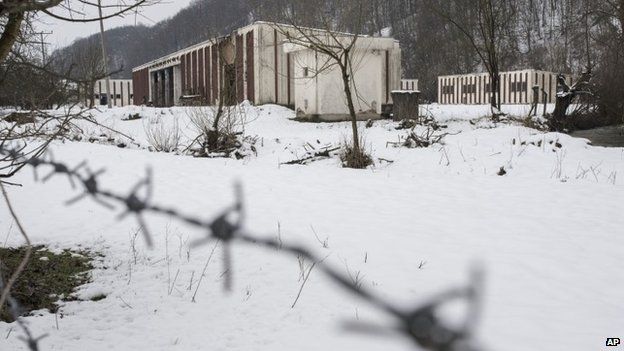Serbia arrests seven over 1995 Srebrenica massacre
- Published

Serbian police have arrested seven men accused of taking part in the slaughter of over 1,000 Muslims at a warehouse on the outskirts of Srebrenica.
The seven are among the first to be arrested by Serbia for carrying out the Srebrenica massacre in July 1995, Serbian and Bosnian prosecutors say.
Serbia has previously detained men not directly involved in the killings.
In 2011, it handed over former Bosnian Serb commander Ratko Mladic to an international court.
Mr Mladic, accused of masterminding the massacre, is currently being tried in The Hague.
The international tribunal at The Hague has already convicted numerous people of genocide in relation to the Srebrenica massacre.
But the BBC's Guy Delauney in Belgrade says that Wednesday's arrests mean that for the first time such a case will be heard in Serbia.
Our correspondent says that the arrests are the biggest breakthrough since war crimes courts in Serbia and Bosnia began co-operating more than three years ago.
About 8,000 Bosnian men and boys were killed in Srebrenica over three days, the worst atrocity on European soil since the Holocaust.
The killings took place a few months before the end of the Bosnian war, when 20,000 refugees fled to Srebrenica to escape Serb forces.
"It is important to stress that this is the first time that our prosecutor's office is dealing with the mass killings of civilians and war prisoners in Srebrenica," lead Serb prosecutor Bruno Vekaric told the Associated Press news agency in relation to Wednesday's arrests.
Mr Vekaric said that Serbia was approaching a defining moment.
"We have never dealt with a crime of such proportions," he said. "It is very important for Serbia to take a clear position toward Srebrenica through a court process."
Among those arrested on Wednesday was Nedeljko Milidragovic, a former commander in the ethnic-Serb police known as "Nedjo the Butcher", who had since become a successful businessman in Serbia, AP reported.
Mr Milidragovic is already facing genocide charges in Bosnia, but had been able to live freely in Serbia because of the lack of an extradition treaty.
The agreement between the Serbian and Bosnian courts means he - and the others - are now likely face the same charges in Belgrade.
Wednesday's arrests follow moves by Bosnia and Serbia in December to arrest 15 men suspected of a 1993 atrocity in which 19 people were hauled off a train and killed. Serbian police arrested five suspects, while 10 were arrested in Bosnia.
Proceeding against war crimes suspects can be difficult for the Serb authorities, correspondents say.
Many Serbs still regard wartime leaders such as Mr Mladic and former Bosnian Serb President Radovan Karadzic - who is also on trial in The Hague - as war heroes who are victims of Western scheming.
However, Serbia's government is thought to be pushing the prosecutions process forward in part because it wants to join the European Union.
6-8 July 1995: Bosnian Serb forces start shelling Srebrenica enclave
9 July: Bosnian Serbs step up shelling; thousands of Bosnian Muslim refugees flee to Srebrenica
10 July: Dutch peacekeepers request UN air support after Bosnian Serbs shell Dutch positions. Large crowds of refugees gather around Dutch positions
11 July: More than 20,000 refugees flee to main Dutch base at Potocari. Serbs threaten to kill Dutch hostages and shell refugees after Dutch F-16 fighters bomb Serb positions. Bosnian Serb commander Ratko Mladic enters Srebrenica and delivers ultimatum that Muslims must hand over weapons
12 July: An estimated 23,000 women and children are deported to Muslim territory; men aged 12-77 taken "for interrogation" and held in trucks and warehouses
13 July: First killings of unarmed Muslims take place near village of Kravica. Peacekeepers hand over some 5,000 Muslims sheltering at Dutch base in exchange for the release of 14 Dutch peacekeepers held by Bosnian Serbs
14 July: Reports of massacres start to emerge
- Published16 July 2014
- Published1 March 2015
- Published30 January 2015
- Published5 December 2014
- Published7 August 2014
- Published16 July 2014
- Published11 July 2010